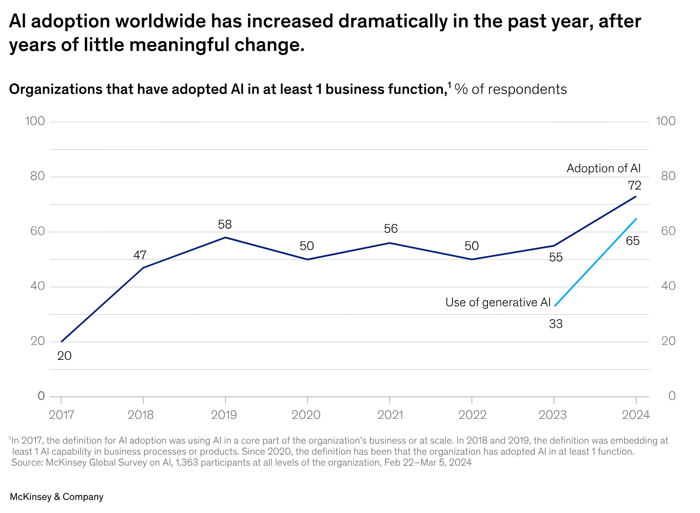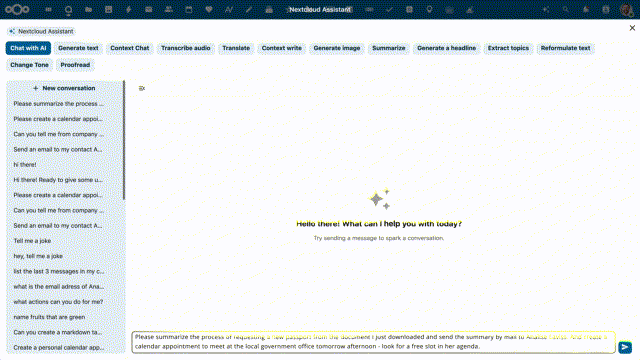In our daily conversations with clients across Singapore and the broader Asia-Pacific region, one topic consistently dominates discussions: enterprise AI implementation. These aren’t speculative discussions about future technology—they’re urgent strategic conversations focused on practical deployment. Executives we meet are no longer debating whether to implement AI, but rather how quickly they can responsibly integrate these tools while maintaining competitive advantage.
What makes these conversations particularly nuanced is the tension between two compelling forces. On one hand, our clients recognize the remarkable efficiency gains AI promises — especially in knowledge-intensive industries that form Singapore’s economic backbone. On the other hand, they express well-founded concerns about data privacy, regulatory compliance, and intellectual property protection.
This challenging paradox—how to harness AI’s transformative power while maintaining control over sensitive corporate information — has led us to a consistent recommendation for many of our clients. Based on these real-world implementation challenges, we’ve found Nextcloud AI Assistant to be consistently the best solution to bridge this gap, providing advanced AI capabilities while ensuring complete data sovereignty and seamless integration with existing workflows.
The AI Revolution in Enterprise
According to a 2024 McKinsey Digital report, 72% of organizations have adopted AI in at least one business function. The Asia-Pacific region, including Greater China, has seen significant upticks in gen AI use, reflecting a growing trend across various industries.

The rapid adoption of AI in the workplace is driven by its significant impact on productivity. Another study, this time the Freshworks Global AI Report 2024, shows employees estimate that AI is already reducing their workloads by approximately 3 hours and 47 minutes in a typical workweek by assisting with tasks like summarizing reports and handling repetitive duties. This equates to nearly 24 business days saved per year, allowing employees to focus on higher-value work.

Similarly, the Adecco Group’s 2024 Global Workforce of the Future survey found that AI is saving workers an average of one hour each day, with some reporting savings of up to 2 hours daily. These time savings enable employees to devote more energy to creative tasks, strategic thinking, and achieving a better work-life balance.
For Singapore-based companies competing in the global marketplace, leveraging AI to enhance productivity is not just advantageous — it’s essential.
However, adoption statistics tell only part of the story. The more important question is how enterprises are leveraging these powerful tools to transform their operations.
Top Enterprise AI Use Cases
The most successful AI implementations in enterprise settings tend to focus on three key areas:
1. Document Processing & Knowledge Management
AI excels at dealing with large volumes of unstructured information — precisely the type that accumulates within enterprise environments. From automatically summarizing lengthy reports to extracting key information from contracts, AI tools can process documents at scale while maintaining context. For information-intensive industries like financial services, legal, and professional consulting — all strong sectors in Singapore’s economy — these capabilities translate directly to competitive advantage.
2. Communication Enhancement
Corporate communication occupies significant employee time, often with repetitive patterns that AI can effectively augment. Email drafting assistance, meeting transcription and summarization, and multilingual translation services enable employees to communicate more efficiently. In Singapore’s multicultural business environment, where communication frequently crosses language barriers, these tools prove particularly valuable.
3. Decision Support & Analysis
Perhaps the most transformative application is AI’s ability to analyze data trends and support decision-making processes. From visualizing complex datasets to identifying emerging patterns, AI tools help human decision-makers process more information than would otherwise be possible. For strategic roles, this means better-informed decisions made with greater confidence and speed.
The Hidden Risks of Public AI Tools
Despite these compelling benefits, the mainstream adoption of public AI tools presents significant risks that many organizations underestimate.
1. Data Privacy
Data privacy concerns top the list. When employees use public AI services, they often inadvertently share sensitive corporate information with external providers. According to IBM’s 2023 Cost of a Data Breach Report, the average cost of a data breach in Asia-Pacific reached US$3.2 million, highlighting the financial stakes of such exposures.
2. Data Sovereignty
Data sovereignty issues compound this problem. Information processed through public AI services becomes subject to the jurisdiction where those services operate — potentially conflicting with local regulations like Singapore’s Personal Data Protection Act (PDPA) or similar frameworks across ASEAN nations.
3. Intellectual Property
Intellectual property vulnerabilities represent another critical concern. When proprietary information, research findings, or strategic plans are processed through external AI services, organizations risk compromising their competitive advantages. For Singapore’s knowledge economy, where intellectual capital drives economic value, this risk is particularly acute.
4. Compliance Requirements
Finally, compliance requirements grow increasingly complex as regulatory frameworks evolve to address AI’s unique challenges. Singapore’s Model AI Governance Framework and the forthcoming EU AI Act exemplify how regulatory expectations are maturing, creating compliance obligations that public AI tools rarely address adequately.
The “Own GPT” Challenge
Recognizing these risks, many forward-thinking organizations aspire to deploy their own AI capabilities — essentially creating “their own GPT” that operates within their security perimeter and governance framework.
However, this aspiration quickly encounters practical obstacles:
First, enterprise data typically exists across disparate systems — document repositories, email servers, CRM platforms, and specialized business applications. Bringing this fragmented information together for AI processing requires significant integration work.
Second, the technical complexity of implementing AI solutions remains daunting. According to Korn Ferry, job openings directly related to generative AI are up 42% this year, while the supply of qualified professionals remains severely limited. For many organizations, especially SMEs that form the backbone of Singapore’s economy, recruiting specialized AI talent is simply not feasible.
Third, even when technical implementation succeeds, the challenge of making AI tools accessible to non-technical employees remains. Complex interfaces or specialized knowledge requirements can severely limit adoption and undermine return on investment.
Finally, the cost implications of building custom AI solutions can be prohibitive, particularly when factoring in ongoing maintenance, model updates, and scaling requirements.
Nextcloud AI Assistant - A Game-Changing Approach
Nextcloud AI Assistant addresses these enterprise AI challenges through a fundamentally different approach that integrates AI capabilities directly into your collaboration platform.

This innovative solution offers four key advantages that set it apart:
-
Model Flexibility and Control: AI models can run locally/on-prem or at trusted third-party providers, maintaining complete control over where and how your data is processed.
-
Data Privacy by Design: Enterprises get unprecedented visibility into data processing flows with clear information about where data travels and how it’s used.
-
Seamless Integration with Workplace Tools: AI gets native access to your organizational information without requiring data duplication or migration.
-
Accessibility and User Experience: powerful AI models are accessed through the same interface employees use daily, eliminating learning curves and reducing shadow IT risks.
Want to explore how Nextcloud AI Assistant can transform your organization’s approach to AI while maintaining data sovereignty? Read our in-depth analysis in our upcoming article focused exclusively on this game-changing solution.
The Path Forward
As AI adoption accelerates across Singapore and the broader Asia-Pacific region, organizations face a critical choice between embracing productivity benefits while accepting privacy risks, or foregoing these advantages to protect sensitive information. Nextcloud AI Assistant eliminates this false dichotomy.
By offering a balanced approach that respects both innovation needs and governance requirements, Nextcloud enables organizations to deploy AI in ways that align with business objectives and compliance. For companies navigating dynamic business environments, this represents the most viable path to responsible AI adoption.
The future of enterprise AI isn’t about choosing between capability and control—it’s about solutions that deliver both. Nextcloud AI Assistant stands at the forefront of this evolution, helping organizations harness powerful AI technologies while maintaining complete sovereignty over their most valuable asset: their data.
Contact our team to learn how you can implement Nextcloud AI Assistant in your organization while maintaining complete data sovereignty.
